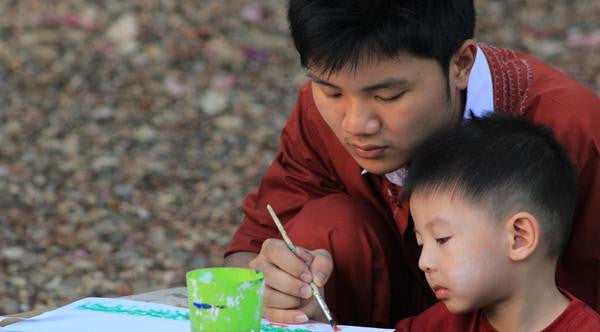Have you ever heard of the Minoans? How about the Lenka – at least their direct descendants are still around. What about the Shan people. Of these three cultures, the Shan are still here, there culture is somewhat intact, but they are struggling to maintain it. The Shan history is long and troubled but it is recent history that has seen the Shan homeland split across international borders, into Burma and Thailand.

Kon Chai Moon is a young Shan man who left Burma and is now a documented refugee trying to survive and prosper in Chiang Mai, Thailand. He also wants to work towards preserving his culture with the next generation, even in this new, foreign home.
Art Relief International is an organization based in Chiang Mai that works to preserve and promote traditional cultures and uses art as therapy. The organization has no great method to measure success, but they do offer Kon Chai Moon an opportunity of artistic consolation, as well as the means to teach a younger generation about Shan ways.

A Shan deer dance ceremony in the early 1900s
Following the story of Kon Chai Moon is a stark reminder to us all about the importance of culture and community. His story is also a shining example of how sometimes you have to go on walkabout, take jobs you don't want and walk, think and explore long and hard in order to return and share that knowledge in the name of preserving your own heritage. Thank you Kon Chai Moon for the lesson and keep up the great work!
Several of our villagers share the same story, which aren't told nearly enough. Take Head Weaver Shamji of Bhujodi India for example, The man behind our amazing
India 8 hand woven textiles. Shamji's son walked the same path as Kon Chai Moon. He left the Bhujodi village with money the family scraped together from selling their handmade textiles and flew to Sydney Australia to attend University.
He left with a business degree and returned home to Bhujodi. He then went on to help his family set up computers, a more streamlined business model and a process that would not only put less strain on the artisans but give them access to a larger marketplace in Bhuj, Gujarat, India and beyond. Without his efforts, Ethnotek's involvement with Shamji and the Vishram Valji family business wouldn't be possible.
 Founder Jake Orak with Shamji on our first sourcing trip to India. Birthplace of the Raja Pack.
Founder Jake Orak with Shamji on our first sourcing trip to India. Birthplace of the Raja Pack.




